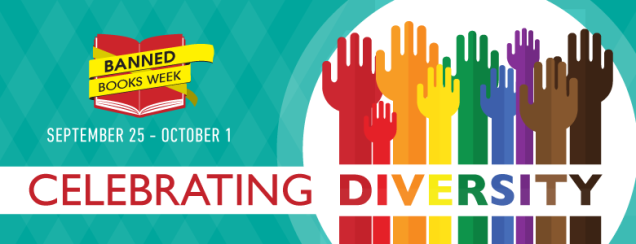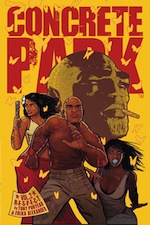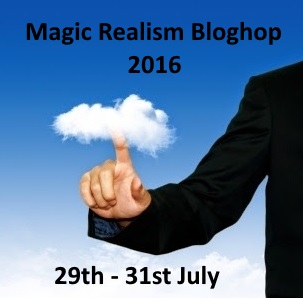The Lovecraft eZine, founded and managed by editor Mike Davis, focuses on weird fiction, cosmic horror, and the Cthulhu Mythos.
#BannedBooksWeek: I Celebrate Diversity!

#BannedBooksWeek: I Celebrate Diversity!
From September 25th to October 1st, authors, readers, publishers, and constitutional right advocates will celebrate books that have been banned for whatever reasons. This year, Banned Books Week is looking at diversity. Although diversity isn’t a new word, some may imagine diversity as a person of color. Diversity, however, includes people who are of different appearance, ethnicity, religion, gender and gender identity, age, physical and mental ability, sexual orientation, military status, and economic status.
The American Library Association’s Office for Intellectual Freedom has shown that 52% of the books challenged or banned in the past 10 years were from diverse content (Association of American Publishers).
“It’s alarming to see so many diverse voices facing censorship,” says Comic Book Legal Defense Fund (CBLDF) Executive Director Charles Brownstein. “By shining a light on how these ideas are censored, we hope to encourage opportunities to create engagement and understanding within our communities, and to emphasize the fundamental importance of the freed to read. (Comic Book Legal Defense Fund, Spring 2016)
As an artist, writer, and reader of color, banning diverse books makes my mouth go dry. I understand that parents–who make the biggest fuss in censoring books–want to protect their children from offensive language, violent content, nudity, sexual content, and other themes, but completely shielding them won’t help them transition into the real world. Literacy is a learning opportunity to read and hear different voices who’ll they may encounter in their lifetimes, to cultivate resourceful, imaginative, and creative individuals.
And banning a book doesn’t guarantee that they won’t read it. All in all, if there is a book that screams, “I should be banned,” look for something else to read.
Magic Realism Bloghop 2016 — kathybrysona
Time for the 2016 Magic Realism Bloghop, exploring where magic and reality merge! We’re looking at what happens when you add “fantastic or mythical elements into otherwise realistic fiction.” Click on the blue frog button below to visit over twenty blogs posting about magic realism. New posts will be added over the next 3 days, […]
Free Writing Workshops for Young Women Writers at The Carnegie Center
Free Writing Workshops for Young Women Writers at The Carnegie Center
The Carnegie Center, located in Lexington, Kentucky, is taking applications for the 2016 Young Women Writers Program, a series of free writing workshops geared toward youth interested in expressing themselves through writing. A committee will choose 6 promising writers in grades nine to twelve to participate in six 4-hour workshops.
February 13: Magical Realism with Sarah Combs
February 20: Creative Nonfiction with Journey McAndrews
February 27: Fantasy with Gwenda Bond
March 5: Spellbinding:The Art of Performance with Bianca Spriggs
March 12: TBA
March 19: Poetry with Kate Hadfield
Writers with professional literary backgrounds will teach the participants how to express themselves through different genres such as sci-fi, young adult fiction, and creative nonfiction. Participants will also master the methods of giving a successful public reading, as well as learn about different careers in writing and publishing.
Deadline for applications is January 8, 2016. Download an application here.

The Carnegie Center for Literacy & Learning
251 West Second Street
Lexington, Kentucky 40507
P:(859) 254-4175 / F:(859) 281-1151
ccll1@carnegiecenterlex.org
See more at: http://writingcareer.com/post/135114248876/free-writing-workshops-for-young-women-writers-at#sthash.87cyNwqb.dpuf
Read more at: http://writingcareer.com/post/135114248876/free-writing-workshops-for-young-women-writers-at
Detachment
Detachment
Vivian Gornick, writer of In Search of Ali Mahmoud; An American Woman in Egypt, once said that her problem with documenting her life in Egyptian was detachment. “I didn’t even know [detachment] was something to be prized—that, in fact, it was crucial, that without detachment there can be no story” (They Went: The Art and Craft of Travel Writing (The Writer’s Craft), p.111). How two people are different—an accomplished author and travel writer who has lived double the life of an American teacher in Japan—can suddenly look similar is what makes writing about our lives so fun.
When I try to convey Japan in text, I’m paralyzed with emotion sometimes. I want readers to understand that the wonders of Japan, whether it be its famous anime industry or its traditions, need to be treated with respect, not excitement or narrowness. But I can’t find the right words to explain everything I’ve experienced in 5 years. Maybe I haven’t found the right second to write it.
While Ms. Gornick was in Egypt, she took notes of her adventures. Tobias Schneebaum kept a journal when he visited the Asmat that resulted in his book, Where the Spirits Dwell: An Odyssey in the Jungle of New Guinea. Notes! Journals! Why am I so unprepared and unorganized in tracking my life through the urban woods of Japan? I think back at the times when I wanted to write about the Dream Robot Exhibition where the Terminator, AstroBoy, and other robots danced and shined in my childlike vision; when I took pictures on an obsolete slider phone, hoping that later I’d email them to myself and didn’t; when the numbers and email addresses and names on my contact list fail to bring a face to my memory.
It’s a good possibility that my memory, though fuzzy as it is, holds more emotion than actual memories. My best friend from mainland Japan is my brother. My friend with CWH on my contact list is my beloved uncle who makes me laugh and think, a real mentor and father figure for the one I don’t have. And my Japanese tutor who corrected my diary entries brings calm and warm conversations to mind. The many students who tried to hug me but policy forbid any physical contact between foreigner and student made me feel pride at their graduation and joy at their transition into college goers. The teachers who changed my view of every day life in Japan, picking apart my quiet stereotypes and giving me laughter and lessons, remain at the forefront of memories labeled “work life”. I struggle to sort these feelings into cohesive thoughts, and I suddenly understand, after being shy of 2 months in the US, Ms. Gornick’s detachment issues.
Every writer—every person—needs to take a step to the side and look at their experiences and surroundings with unclouded eyes. Without that clear vision, the memories tumble out and confuse listeners and readers. I’d like to lead an unambiguous life, a life without struggle for both me and those around me.
The real question for me is: can I construct a real memory without emotion, or do I stand on one side, sifting them from one another, without actually saying anything? The latter is what I fear the most. I hope in the future I’ll understand what my memories truly mean to me.
Publishers Weekly 50% off Subscription for KWL Authors
Check this deal out!
Want to be in the know?
Stay in touch with the book biz with a subscription to Publishers Weekly, currently available to Kobo Writing Life Authors in Canada and the United States at a 50% discount off a one year subscription for a limited time, with promo code PUBWEEKLY50.
Publishers Weekly, familiarly known in the book world as PW and “the bible of the book business,” is a weekly news magazine focused on the international book publishing business. It is targeted at publishers, booksellers, librarians, literary agents, authors and the media. It offers feature articles and news on all aspects of the book business, bestsellers lists in a number of categories, and industry statistics, but its best known service is pre-publication book reviews, publishing some 8,000 per year.
The magazine was born in 1872 as The Publishers’ Weekly (the article and the apostrophe were later dropped), a…
View original post 59 more words
Five Books About Magical Realism
Read Tony Puryear’s article at Tor.com.
Cover of “Concrete Park” by Erika Alexander and Tony Puryear

How To Get Difficult Books Into The Media
In an increasingly commercial and competitive media-sphere, getting media coverage for ‘difficult books’—books not written by established authors and not published by well-known publishers—might strike independent authors as mission impossible. However, many creative ways can be found to reach your desired audience.
View original post 903 more words
Gabriel García Márquez’s Formative Reading List
Call for Works in Translation
New e-zine looking for some poetry and fiction!





